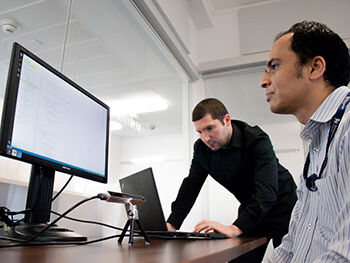University News Last updated 07 March 2022

Birmingham City University is carrying out new research to develop vital and cutting edge technology to improve accessibility and assistance for disabled people after clinching funding from tech giants Google, Adobe and Meta.
Associate Professor Dr Chris Creed, a researcher in Human-Computer Interaction (HCI) at the School of Computing and Digital Technology, successfully secured the funding grants to explore new solutions around widening opportunities, participation, and inclusivity for disabled people across the globe.
The Adobe grant is supporting Dr Creed and his team through developing software that enables people with physical impairments, resulting from conditions such as Motor Neurone Disease and Multiple Sclerosis, to control popular graphical editing applications such as Photoshop and Illustrator. This research will enable designers of all abilities to engage with digital creative activities for both personal projects and the production of professional quality outputs.
Meta, formerly known as Facebook, is also funding further research in a similar field, which focuses on improving accessibility and experiences within the rapidly-growing areas of Virtual and Augmented Reality (VR/AR) for disabled people across a wide spectrum of visual, physical, auditory, and cognitive impairments.
As part of their research, Dr Creed, Dr Ian Williams, and Dr Maite Frutos-Pascual from Birmingham City University's Digital Media Technology Lab (DMT Lab) are currently leading a series of multi-disciplinary events for academics, charities, disabled people, and disability specialists in order to help accelerate research innovation in this area.
National charities, special needs colleges and schools, disability employment specialists, disability arts organisations and individuals with different forms of impairment are all expected to benefit from the team's findings.
Research funding provided by Google will investigate alternatives to using traditional computing tools such as a mouse and keyboard to support those with physical impairments working within the software engineering sector. Controlling mainstream digital systems within technical domains typically requires extensive use of common input devices and can be particularly problematic for disabled users. The School of Computing and Digital Technology will develop multimodal systems and processes, using eye gaze, voice control and switches, to improve key activities for disabled users in areas such as coding and application development.